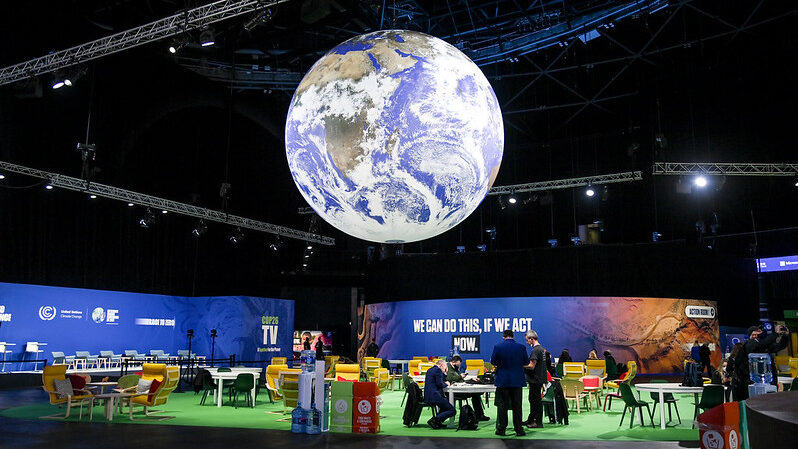We cannot separate the nature and climate crises.
They are inextricably linked and must be addressed together and without delay. Biodiversity loss and environmental degradation are accelerated by climate change but also, in turn, exacerbate its impact. To delay action means deliberately ignoring our responsibility to limit global temperature rise and protect the planet’s fragile ecosystems.
We are in the decisive decade of delivery. Keeping global warming to below 1.5C will require businesses of all sizes across all industries and regions to have the courage to go all in on their 2030 commitments to halve emissions and end nature loss across their full value chains. This will set them on course to reach net-zero emissions by 2050 at the latest.
To achieve our climate goals we must preserve nature. Without nature acting as a carbon sink, global temperatures would already have risen more than 1.5C with deadly consequences: increased drought, lower crop yields, massive coral reef death and rapidly rising sea levels. This demonstrates how we can’t take nature for granted. We must make concerted efforts to allow it to flourish and fulfil its carbon capture potential through its ecosystems, on land and in the ocean.
Nature’s benefits aren’t only in its carbon capturing abilities, but in services which underpin human health, flood prevention, biodiversity and providing habitats for animals. In addition, nature’s contribution to the global economy could be worth $125 trillion annually.
This is why governments at Cop26 in Glasgow must deliver three key outcomes that will promote the role of nature in the Paris Agreement.
From carbon source to carbon sink
First, governments around the world need to extend the ambition of their national climate plans, the so-called nationally determined contributions (NDCs). This must include clear pathways for implementing policies today that will transform forests, and other land uses, from being carbon sources to carbon sinks by 2030. Existing plans fall short.
Cop26 must result in robust and unified measures to tackle deforestation and ensure forests absorb more carbon than they emit within the next ten years. We welcome pledges made in the first days of Cop by over 100 global leaders representing over 85% of the world’s forests to halt and reverse deforestation and land degradation by 2030. However, commitments are only of value if they are followed by action.
Since we are fast approaching the point of no return. To create a stable, net-zero and nature-positive planet we need action now.
Scaling finance for nature
Secondly, governments must channel financing to initiatives which support the transition of land and nature to low carbon uses. Despite nature’s potential to contribute 30% of the climate mitigation needed by 2030, it has only received 5% of international climate finance. This imbalance must be addressed now. We call on governments to increase the share of international climate finance directed to nature to 30% by 2025.
Reach agreement on Article 6
Article 6 of the Paris Agreement holds the key to unleashing the power of private sector investments. Article 6 is the mechanism that would formalise rules around a global carbon trading system. This system would incentivise private sector investment in activities that both reduce emissions and remove carbon from the atmosphere, particularly in relation to activities around forest management and restoration. A regulated carbon credit market would deliver defined incentives to reduce carbon emissions, and therefore accelerate global private sector climate policy ambition.
At Cop26, we call on negotiators to finalise the Article 6 framework, agree on mechanisms that will ensure emissions are fairly measured across all countries, and ensure that investments are made with integrity and due diligence.
Article 6 would also support the development of a consistent and credible cross-border fiscal system. This is critical to achieving the economic delivery of effective, urgent action to remove carbon from the atmosphere on a truly global scale. For example, it would facilitate opportunities for companies from North America and Europe to channel desperately needed funding to protect the Amazon rainforest in Brazil. These investments could be made through a variety of channels in a way that supports indigenous peoples and local communities that are proven guardians of the forest.
As well as global policy makers, the private sector has a key role in delivering a successful Cop26 for nature. More companies must get on track for reaching net-zero by 2050 at the latest and work towards regular and ambitious interim science-based targets.
Today, companies need to be scaling up existing low-carbon initiatives and technologies, addressing all sources of emissions within their value chains and developing low-carbon solutions where they currently do not yet exist. Alongside this, investing in nature-based solutions beyond value chains is critical – to compensate for emissions that cannot yet be cut, and to ensure 1.5C won’t slip out of reach.
This planet is our home. It binds us all together and is our permanent connection as a global community. The climate and nature emergencies we face cannot be solved by one company or indeed one industry alone, it is time for us to stand together. We have a generational responsibility to create a stable, net-zero and nature-positive planet, but we are fast approaching the point of no return. We need action now.
Maria Mendiluce is CEO of We Mean Business Coalition and Walter Schalka is CEO of Suzano.
This post was sponsored by We Mean Business. See our editorial guidelines for what this means.
